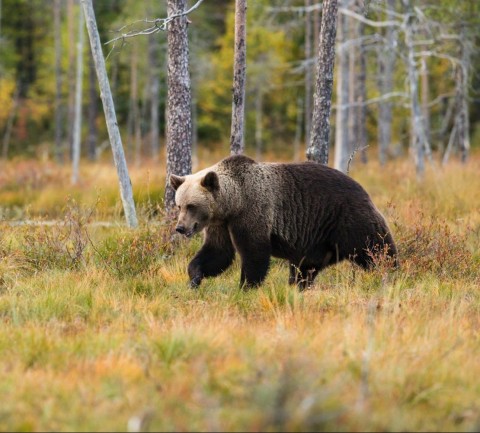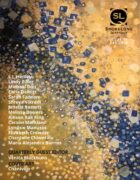They say there have been bears spotted all over Goffstown in these final days of summer, but I know it is the same bear. She emerges at dawn and dusk in search of food, getting fat for the winter, and I wish that were something humans could say without it being a self-deprecating joke. The news urges homeowners to bring their bird feeders inside so they don’t lure bears into the neighborhood, but each night I leave her a wooden bowl of berries, corn, acorns, honey, and grass on my back porch. When I pick it up in the morning, it is always smooth and empty, and I lay my palm in its belly to see if it holds any of her warmth. But too long has passed for it to be anything but cool so I just imagine her warmth there because it doesn’t hurt anyone to pretend.
The bear is my sister, but I would never tell the town that. It would only lead to odd glances and pitying mouths anytime I went to the market for fruit or beer or shampoo. Whispering Poor Sophia if they believed me and if they didn’t. There is nothing to pity, really. I can’t miss my sister when I get to see her often. When I can nourish her. I watch her eat from inside my house, never going outside, even though her dark fur looks so soft and it would be nice to pat her head. But I know she wouldn’t like that.
All of the security camera footage that captures her in driveways and backyards is funny to see on TV, one after the other and even side by side as they wonder if we’re facing a serious bear population problem. But if they looked closely, they would see the slender scar on her chin from when she fell off her scooter as a kid and know it is always the same bear. That day with the scooter, I picked her up from the concrete as she gushed blood, and from that day forward, anytime I looked at the puffy pink scar like a caterpillar on her chin, I’d be reminded of how tenuous existence is when you have to worry about someone else.
A few months later, I’m watching another news story about the supposed bear influx, how Goffstown is just one of several New Hampshire towns experiencing the surge, and an anchor says, “They’re wild animals and we should do anything we can to keep them at bay.” It’s that night that I decide to wait with my offering on the back porch instead of watching from inside. The rain is horrendous, and it has turned the sky to melted metal. Lightning strikes across the lake, thin and scraggly like the scar on my hip. In that brief flicker, the mass of her is visible stumbling through my grass and I can almost feel a pulse on that hip scar. She didn’t mean to give it to me. It’s from earlier this year when she first became a bear and was adjusting to the size of her paws and how to use them. It’s still healing. I chose not to get stiches, just like she didn’t get stiches for her chin, Mom and Dad saying there is nothing wrong with a scar—it is just a city on the body’s map. Sometimes it feels like the strange pain of sibling love is threaded right into my skin.
My sister approaches the steps, and if she is surprised to see me, her face shows no change. I chuckle when I remind myself her human face didn’t move much anyway. I stand up and slowly move towards her, hand out. Her head moves and I fear the white flash of her teeth, but she leans her head into my hand. The small, tender gesture is so unlike her, so unlike a bear, that I forget my respectful reservations and hug her tight. And in my arms, she turns to a young person again. I can feel her elbow and her hair, and I imagine the sound of her voice now that she can speak again. I can feel her about to roll her eyes and call me an idiot, and I will laugh because she’s right.
But when I pull back to look at her, I am met with unreadable bear eyes. I let go entirely and she moves to eat my offering and then stumbles off. I reach for the bowl and it’s not warm after all. I sit there for an hour or so and think about sustenance, the word sharp in my mind.
I remind myself we have not lost something. The law of conservation of mass: we have simply rearranged the amount of love that was already there into something palatable, like the treats I collect for her in the wooden bowl. When I leave it out the next night, I find that the bowl is full on my porch the following morning. Maybe her moving on somewhere else is for the best. After all, the reason I turned her into a bear was because it’s easier to love her when she is a wild thing by nature instead of by choice; because it’s harder to feel unloved when I can look at my sister and know she can only love as much as being a bear allows.
Then I remember it is simply hibernation time, when her big, black bear heart will slow down to 40 beats per minute. I picture her in a hollowed-out tree in the dark, snoozing contently through most of the year without even a dream of me.



 The core workshop of SmokeLong Fitness is all in writing, so you can take part from anywhere at anytime. We are excited about creating a supportive, consistent and structured environment for flash writers to work on their craft in a community. We are thrilled and proud to say that our workshop participants have won, placed, or been listed in every major flash competition. Community works.
The core workshop of SmokeLong Fitness is all in writing, so you can take part from anywhere at anytime. We are excited about creating a supportive, consistent and structured environment for flash writers to work on their craft in a community. We are thrilled and proud to say that our workshop participants have won, placed, or been listed in every major flash competition. Community works.